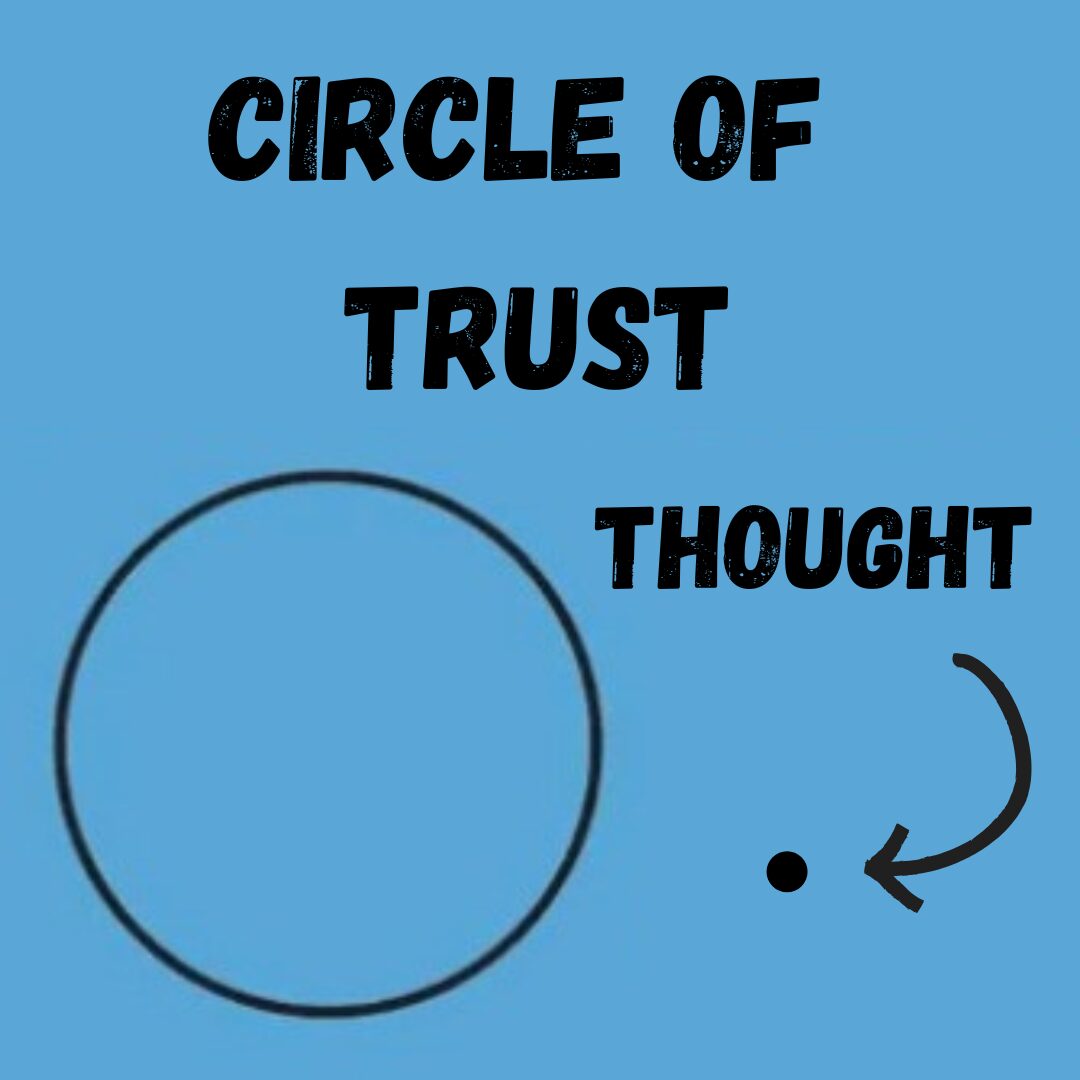I felt unsafe in my own head. It was the fall of 2022, and I was alone in my mother in law’s house. I had become so unbalanced, fearful, and anxious my work asked to take a leave of absence. Lying on the couch, I wrestled with my thoughts. I was caught up in extreme fear and having another “episode.” I felt waves of emotions that I seemed incapable of handling. Beyond overwhelmed and completely helpless, my mind was out of control. My body shook from the contracted energy of my emotions.
Writhing in my own fear, I suddenly questioned whether all this was real. Could I be creating this experience with the way I was using my thoughts?
It was like a switch flipped. The emotions calmed. My body stopped shaking. For the moment, I was clear. Feeling grounded for the first time in weeks, I got up and walked home. I got back on the emotional rollercoaster later, but that distrust created a temporary window of clarity.
We so easily accept the story our consciousness creates for us. Why wouldn’t we? It feels so real, so very compelling. Anyone that is human and has a brain sometimes falls into the illusion of distorted thinking. The power of our consciousness is like a special effects department, masterful at convincing us that what it creates is the truth.
Think you have a trustworthy mind?
Guess what? You don’t.
Don’t feel bad. The thing is, none of us have a trustworthy mind all the time. There are times when every mind makes up painful stories that feel real.
Read this article to know when to trust your thoughts. More importantly, learn when not to.
Every Thought a Lie?
The other month, I was reading the book Coming Home by Dicken Bettinger and Natasha Swerdloff. I am not usually shocked while reading spiritual books, but this one had a line that made my brain feel super bendy. If I was sipping on a drink, I would have spit it out.
“Just for a moment, consider what it would be like if you realized not a single thought you had was true.”
I set the book down after reading that sentence. I heard: every single thought is a lie. Thoughts are temporary, and no thought can capture the expansive truth of who we are. Billions of people are thinking their own different iterations of “truth.” Thought also changes continually, often conflicting with itself. Over time, I catch deeper glimpses of the reality of that realization.

While no thought is the truth, there are times that our minds deserve a little more trust.
Our level of understanding in the world around us shifts constantly. Both illusion and clarity can appear and disappear. No one has a trustworthy mind all the time. Like I had that day in 2022, we all have windows of clarity, even if they only last 5 for minutes. We can all fall into fearful illusion even if only for 5 minutes.
Each person in this world has an unreliable narrator in their heads. At times, you do too. None of us can completely trust the reality our brain creates.
The experience of life comes to us though a thought created filter.
Human thinking can become distorted, warped, and painful, but what if that wasn’t a problem? This is the truth: the mind doesn’t need us to govern it. We don’t need to take on the job of hyper-vigilant thought monitor. We only need to know when our thoughts become less trustworthy.
The Guide
The mind needs a guide. The good news is it has one. Emotions are that guide.
Emotions act as an early warning signal when our thoughts take a dark turn.
Our inner feelings can’t tell us anything about the outside world. They only ever reflect internal weather. Thought and feeling are two sides of the same coin. They are the same energy, one expressed in the mind and one in the body.
Feelings only telling us two things:
How warped our thoughts are,
and
how much we believe those thoughts.
Since we can’t control our thinking, I like to focus on the second part of the equation. Before I found this understanding, I didn’t know that emotions warned me when my thinking goes off the rails.
Instead of trying to control my thoughts, I could simply not believe them.
Could this approach work for you too?
A Movie Date
I love going to the movies. Fresh popcorn slathered with butter, reclining seats, and a good story make it such a treat. I get to lose myself in a drama, laugh at a comedy, and root for my favorite heroes.

What makes movies enjoyable is something movie experts call suspension of disbelief. When we set aside the unreality of the movie, we get to enjoy it more. We know that superheroes can’t soar through the air, bears don’t talk, and world war 2 is over. We need to set aside that knowledge to enjoy the movie.
If we know it is all fake the whole time, we can’t get absorbed in the story.
However, we don’t get rid of all our disbelief. A part of us knows that what is happening on the screen isn’t really happening. Otherwise, when the killer chases the camera with a bloody knife, the entire audience would scream and dash out of the theater. Yet, when a bomb is about to go off in the climax of a film, the audience stays in their seats.
We enjoy movies more from a grounded knowing that we are watching them from a safe and comfortable air conditioned theater (or couch at home).
In the early days of cinema, there is a story about audiences stampeding in fear out of a theater that showed a train coming at the camera. While this story is an urban legend, it shows the power cinema has to create scenes that seem so very real. Every year movies become more convincing with advances in special effects technology.
To have an enjoyable experience watching the movie, we need some disbelief, but not too much. We need to disbelieve in the right ways and at the right times.
The same is true of our minds. We can enjoy life more when we don’t trust our thoughts at the right time. There are times where we shouldn’t believe in our thoughts at all.
Don’t run screaming out of your own brain.
Learn to approach your mind with less fear and control, and life becomes more enjoyable. What if life could become as satisfying as watching your favorite movie? When you distrust you mind in the right way, it does.
When to Distrust

Your emotions are the key to when you should distrust your mind. Emotions tell you when your mind goes sideways. When you feel pain, overwhelm, and low moods, it means you shouldn’t trust in the way your mind is operating. When you feel grounded, peaceful, and content, trust your thoughts more.
In life, remembering this isn’t easy, even if you know it in your heart. I definitely don’t get this perfect every time. The power of challenging emotions sometimes pulls me into a distorted reality. Thoughts can convince you to invest in the truth of powerful feelings. Your healthy distrust tends to fly out the window when emotions grow in strength. A thought created reality turns into your experience of reality, becoming invisible.
You can wake up to the fact that painful thoughts are creating painful feelings. If you understand the fluid nature of thoughts, you can more quickly let go of painful thoughts. This is through an intuitive understanding.
This is great news! Mistrust your thoughts when they say that you suck. Mistrust your thoughts when they tell you you aren’t enough. Mistrust any thoughts that judge, worry, or criticize. Why? Because they feel terrible.
Never trust a fart when sick. Likewise, never trust a thought when you feel down. It’s probably shit.
Any thought attached to a painful emotion can be dismissed.
Again, your emotions can only ever tell you about what is happening inside. They only ever reflect your inner world, the present state of your mind.
Because of this, you can’t rely on them to provide any information about anything external. While they can’t help you with anything outside, they can guide you inside. When you understand your mind, you start to use your emotions to cue you when your thoughts go astray. They tell you the exact level of distrust you should have in your mind.
Emotions are one hundred percent accurate reflection of the state of your mind.
When your emotions rise, trust in your mind and thoughts more. When your level of feeling lowers, distrust your thoughts. The lower your feeling, the more you shouldn’t believe in your reality.
May your next bad mood be a tap on the shoulder.
Even Positive Thoughts?
There is a power in not trusting your thinking. It woke me up when I was lost in fear.
I try to reserve a little bit of suspicion that my mind isn’t telling me the whole story even when I feel amazing. When used in this way, distrust becomes a doorway to deeper insight and truth. There is always something deeper to see, something that we are missing that is invisible to us. Even my most joyful thoughts and feelings are not the full depth of truth.
Isn’t that beautiful? It means love, peace, and contentment are infinite. How wonderful to realize that I have hardly scratched the surface of a limitless understanding.
Get into the habit of not trusting every little thing your brain tells you.
Develop a healthy distrust of your mind.
Doubt your reality.
The Nature of Thought
We don’t have to cultivate our minds. We just need to understand how they work. Minds are naturally fluid. Like waves in the ocean, thoughts crest and fall back into the energy from where they came.
When we attempt to control our minds in order to feel better, our thinking becomes ridgid. We can’t control the uncontrollable even if we try. But we definitely do try, don’t we? Because rigidity is not the natural state of the mind, it resists manipulation and forcing. Resistance is stress.
I used to try to make my mind only have good, happy, and positive thoughts. But the infinite creative power of Thought doesn’t work like a stamp. Thought is varied, contradictory, random, expressive, dramatic, and so much more. Manipulating Thought is like trying to control a hurricane.
Thought is a natural force of our wild, beautiful, and inherent nature.
Thankfully, we don’t need to control Thought. By itself, Thought is neutral and meaningless. When we give life to our thoughts, only then does it take on the power to distort our personal reality. By innocently believing it, we energize the story our mind tells us.
Unquestioned Thought becomes the lens with which we unconsciously see the world.
Don’t Trust Atoms
Michael Neill often tells a joke that his scientist mother has on a t-shirt: Don’t trust atoms, they make up everything.

He says the same is true of thought.
“Don’t trust and atoms, they make up everything.”
– Michael Neill’s Mom’s T-shirt
I might change the joke to: Never trust a thought, they make up experience. This joke reveals the illusionary nature of Thought. Thought makes up experience.
Thought operates through a biased filter of what seems accurate at the time.
The double meaning also points to the fact that Thought creates our experience of life. Like atoms, Thought is expansive, creative, and usually invisible. Thought also makes up experience. It is the base material of our everyday experience of life.
Thoughts are not the enemy. Really, there is no enemy. Your mind only wants to keep you safe. It doesn’t know that you are safe already, and who you really are can’t be harmed. You don’t have to pay attention to all the false alarms. If a life threatening alarm happens in real time, you can and will act on it. All other alarms come from a hypersensitive thought system.
Don’t believe everything your mind tells you.
Where to Trust
If you can’t trust our thoughts, what can you trust?
“If you can’t entirely trust what you think, what about trusting awareness? What about trusting your heart? What about trusting your motivation to at least do no harm? What about trusting your experience until it’s proven to be inaccurate – and then trusting that discovery?”
– Jon Kabat-Zinn
Trust in your feeling state.
While thoughts may lie, feeling never does. Feeling tells you about current thoughts, and you can always trust it to tell you the truth about how distorted they are.
Trust in the changeable nature of your mind.
All thoughts and feelings are temporary. They change more easily when you let them flow, but they will eventually change. New thoughts and feelings will come along, guaranteed. You don’t have to think them up or work to change your perspective. Although it might seem like you will be stuck in a feeling forever, that is only a story your mind tells. Trust that current thinking will dissipate and you will return to wellness.
Trust in the energy behind life.
There is a formless intelligence behind your experience of life. It enlivens your body and senses. Know that it moves ever in a positive direction, lifeward and toward thriving. This energy is the peace of who you are. You are a manifestation of its unconditional love.
You are held, loved, and lifted by the energy of life.

You can trust in the life energy that is who you really are.
So, you have an untrustworthy mind
I do too. We all do.
If it seems too much to ask to distrust your thoughts, start with a little suspicion. Let there be a crack in the the door to a new relationship with your mind. Allow that crack to open the door to mental freedom.
When you accept and understand the true nature of thought, it will guide you back home.
Resources

My name is Rich Life and this is a Realization Reading. I invite you to take part in a transformative conversation.
If you liked this, learn why you can’t mess up at being human.
Much of my writing is based around the 3 Principles understanding of Sydney Banks, and enlightened Scottish mystic. Learn more about him here. The 3 Principles of Mind, Consciousness, and Thought he discovered helps us to understand the nature of our experience.
Those who explore this understanding find that their lives transform. Read more articles if you would like a richer experience of life. If you would like to connect, let me reach out to you or sign up for my mailing list and get Insights in your Inbox.
Please help me reach more people with the message that the core of who you are is peace, love, and connection. Share this article with someone you care about.
Your vibrant life is a single thought away.


Leave a Reply